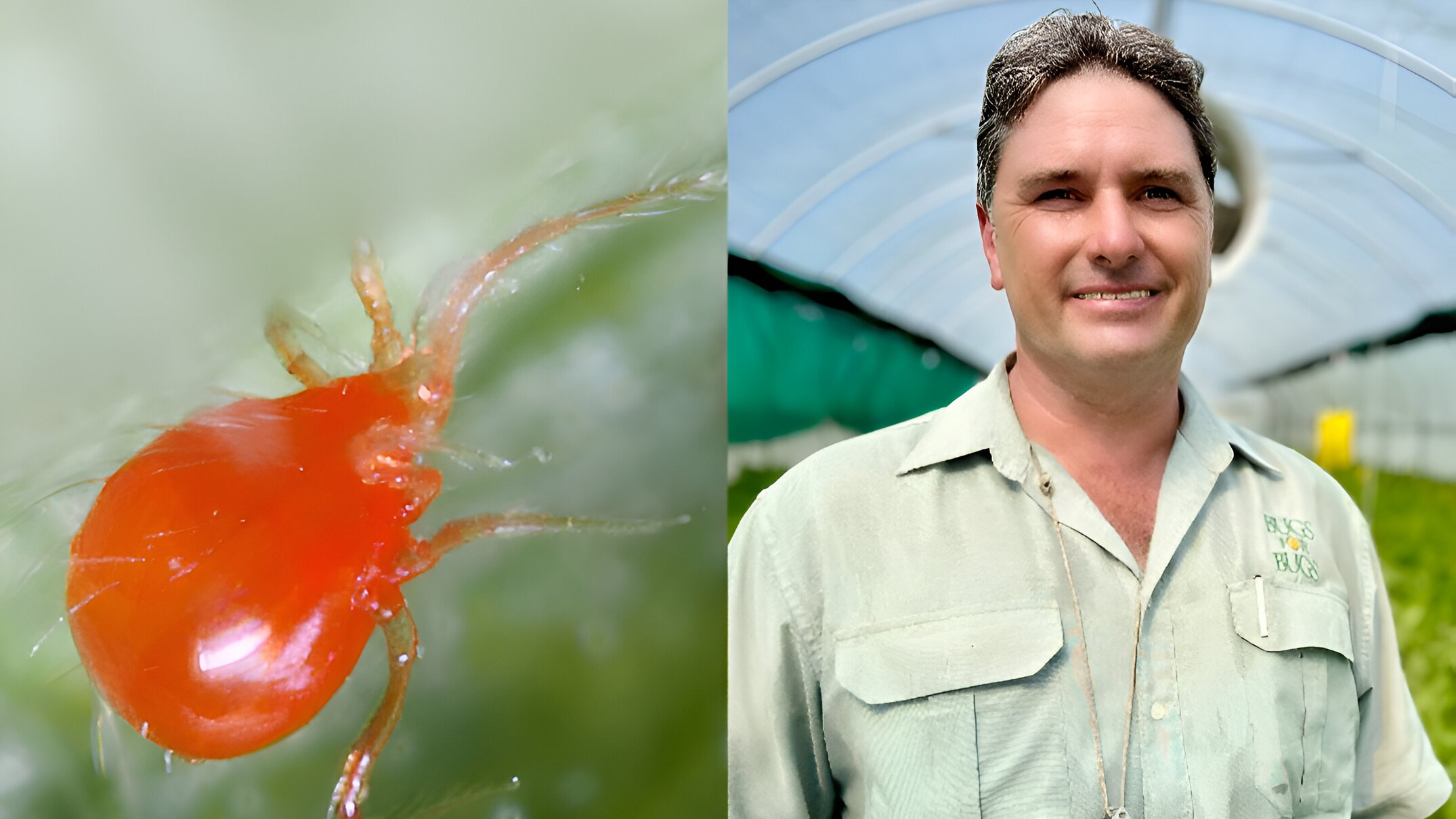
James Hill oversees the breeding of billions of Phytoseiulus persimilis bugs. (Supplied: Bugs for Bugs)
As concern over chemical use in food production grows and insect species become more resistant to poisons, farmers are turning to nature for solutions to pests that can cripple crop production.
Billions of tiny, blind, predatory mites are being bred, harvested, packed on ice, and posted to strawberry farms in the battle against destructive sap-sucking insects.
“We’re producing beneficial insects for farmers to use instead of insecticides,” Bugs for Bugs Donnybrook insectarium manager James Hill said.
“Ninety per cent of farmers in the strawberry industry are using our product.”
The battle
Australians love strawberries — 72 per cent of households bought them last financial year and on average we each ate around 2.27 kilograms of the fruit.
One of the main insect enemies that farmers battle to produce tasty red strawberries is two-spotted mites, a sap-sucking species related to ticks, too tiny to spot with the naked eye.
Left unchecked, you can see the damage two-spotted mites can do, sucking the life out of bean leaves in the polytunnels where they are raised as food for the predator mites that are sold to growers.
“If left unchecked the two-spotted mite would just devastate your crop, it would wipe you out,” Queensland Strawberry Growers president Adrian Schultz said.
The tiny warrior
An eight-legged member of the arachnid family, Phytoseiulus persimilis, is blind.
It hunts down two-spotted mites by touch and scent and can be dropped by drone to decimate populations of two-spotted mites and spider mites.
Just 0.5mm long, persimilis are voracious, specialised predators that breed twice as fast as their prey, can be carried on the wind, and are deployed to protect crops, greenhouses and commercial installations of indoor plants.
Once they have exterminated the pests they turn on their own eggs and larvae, posing no threat to other insects.
Mr Shultz said the insects have become real cost savers for big farms.
[Link youtube drone video]
“In years gone by, we had to rotate different insecticides to control the two-spotted mite and you’d get a higher percentage of pests that were resistant,” he said.
“The advent of the predator mites enabled industry to use considerably less chemicals in controlling pests, now we also have the option of introducing lady beetles into our crops to control aphids.”
Integrated pest management
Integrated pest management (IPM) is increasingly popular with farmers and uses a range of preventive measures to control pests, including natural predators, parasites, nematodes, and pheromone traps.
“It’s not set and forget, you need to monitor the situation and you’ve got to be aware of the impacts of environmental conditions,” Mr Schultz said.
Changing attitudes
The job satisfaction of helping farmers produce higher quality products with fewer chemicals is why Bugs for Bugs director Paul Jones has been working in integrated pest management for 30 years.
“When we first went out to farmers there was a lot of fear and scepticism about reducing the use of sprays and using beneficial insects to control pests,” the agricultural scientist said.
“The change has been quite radical, what was once considered a cottage industry for small organic and family farms has now become the backbone for pest management in conventional agriculture.”
[Landline link]
Bugs for Bugs is one of only a handful of commercial suppliers of beneficial insects in Australia.
From insectaries at Donnybrook, Toowoomba and Mundubbera, it sells 12 different species including predatory mites, ladybirds, lacewings, and parasitic wasps.
Home gardeners can also order the insects online.
Worldwide, predatory bioagents are being used to target gnats, thrips, caterpillars, scale, mealybugs, aphids, heliothis larvae, loopers, whitefly, and mites in crops including strawberries, raspberries, blackberries, cotton, macadamias, almonds, avocados, citrus, maize, cut flowers and hops.
Parasitic wasps kill fly maggots for the poultry, pig, dairy and feedlot industries, and black soldier fly larvae transform organic waste into compost.
At the Donnybrook insectary, billions of persimilis are being harvested from polytunnels for the start of the Queensland winter strawberry season.
Each insect order is weighed and packed on ice to keep the persimilis mites in hibernation during transport.
A vermiculite mineral is included to make it easier for farmers to evenly spread the tiny predators on their fields.
“It’s evolved, refining the craft, we’ve got better and better,” Mr Jones said.
“Mainstream chemical companies now collaborate with us to ensure products are less harmful to beneficial insects.”
News Related-
High court unanimously ruled indefinite detention was unlawful while backing preventive regime
-
Cheika set for contract extension as another Wallabies head coaching candidate slips by
-
Analysis-West's de-risking starts to bite China's prospects
-
'Beyond a joke' Labor won't ensure PTSD protections: MP
-
Formula One season driver ratings: Lando Norris shines as Max Verstappen nears perfection
-
Catalina golfer Tony Riches scores Guinness World Record four holes in one on same hole
-
Florida coach Billy Napier fires assistants Sean Spencer, Corey Raymond with expected staff shakeup ahead
-
Rohingyan refugee NZYQ accidentally named in documents published by high court
-
Colorado loses commitments of 2 more high school recruits
-
Queensland Health issues urgent patient safety alert over national bacteria outbreak
-
Townsville Community Pantry 'distressed' by fruit, vegetable waste at Aldi supermarket
-
What Is The Beaver Moon And What Does It Mean For You?
-
Labor senator Pat Dodson to resign from politics due to health issues
-
Hamas releases 11 more hostages, as Israel agrees to extend ceasefire
